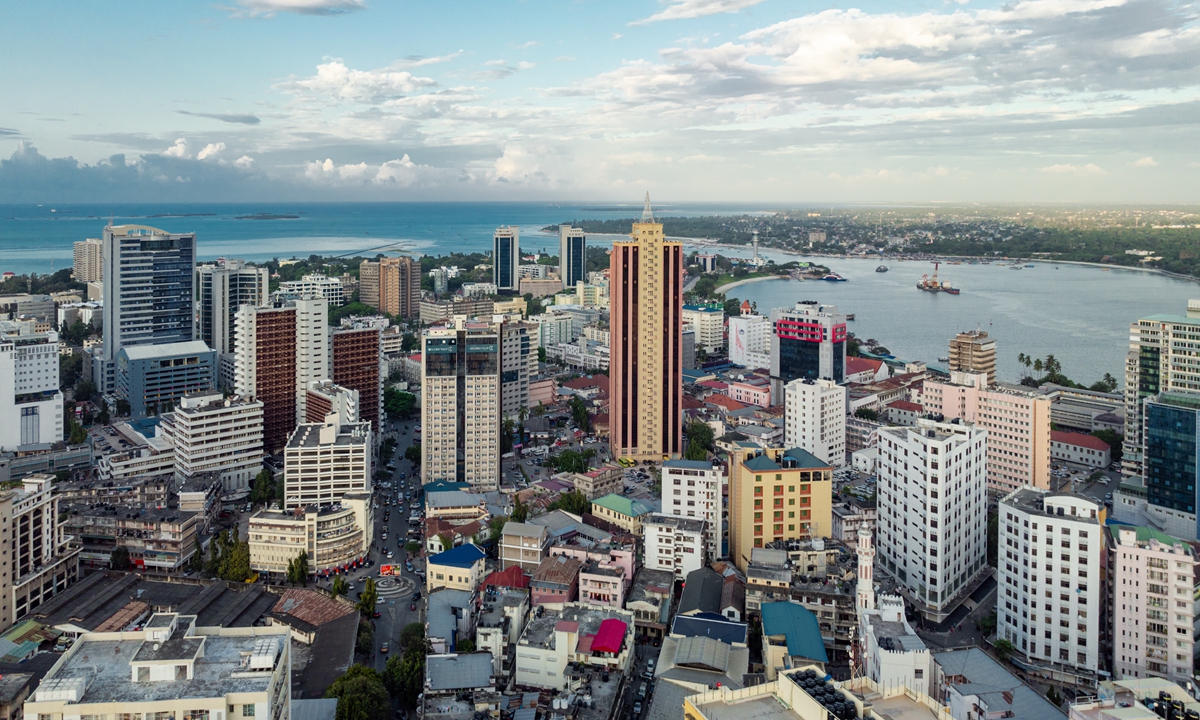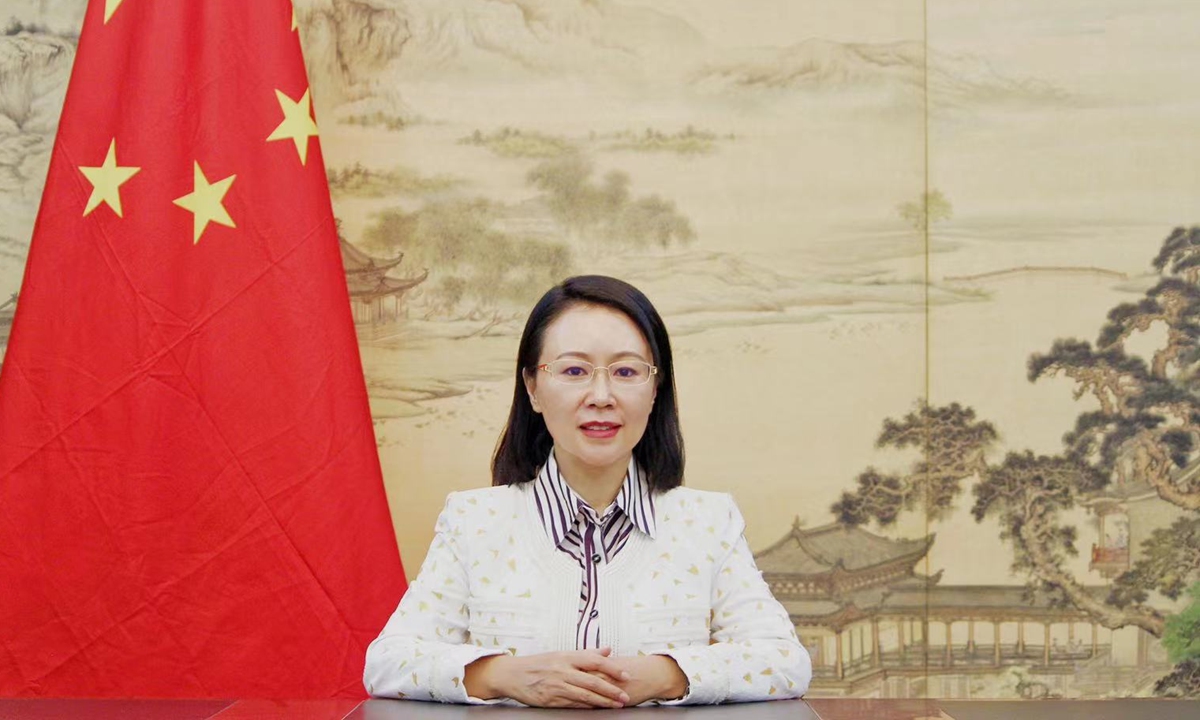
An aerial view of Dar es Salaam, a city in Tanzania Photo:IC
Editor's Note:This year marks the 60th anniversary of diplomatic relations between China and Tanzania. Their economic and trade ties have flourished, with major investments boosting local industrialization and job creation under the Belt and Road Initiative (BRI), aligning with Tanzania's Development Vision 2025. Following the 2024 Summit of the Forum on China-Africa Cooperation, Chinese Ambassador to Tanzania Chen Mingjian (
Chen) talked to the Global Times (
GT) reporter Yin Yeping in an interview, sharing insight into the strengthening of China-Tanzania relations and the prospect for future cooperation.
GT: As China and Tanzania celebrate 60 years of diplomatic relations this year, how do you assess the bilateral achievements so far, and what are your expectations for future relations?Chen: Tanzania is a China's long-standing friend and the place where China's Africa policy in the new era was first proposed. In the 1950s and 1960s, the elder generation of leaders such as late Chairman Mao Zedong and Julius Nyerere, the founding President of Tanzania, together forged the friendship between China and Tanzania.
In 2013, President Xi Jinping proposed, during his state visit to Tanzania, the principles of China's Africa policy - sincerity, real results, amity, and good faith, and he solemnly declared that "China and Africa have always been a community with a shared future."
Since the advent of the new era, China has adhered to the principles, working together with Tanzanian friends to continuously enrich the content of the comprehensive strategic cooperative partnership between China and Tanzania, build a high-level China-Tanzania and China-Africa community with a shared future, and establish a backbone for South-South cooperation and a model for international relations.
I am pleased to share some memorable and touching stories from the China-Tanzania relationship.
In 1971, when the 26th Session of the United Nations (UN) General Assembly declared the restoration of the lawful seat of the People's Republic of China in the UN, thunderous applause erupted in the General Assembly Hall. At that moment, Dr. Salim Ahmed Salim, then representative of Tanzania to the UN, wearing a Zhongshan suit, couldn't help but cheer joyfully on the spot, which left an unforgettable memory.
China and Tanzania have long upheld the principle that all countries, regardless of their size, strength, and wealth are equal, and have fought shoulder to shoulder against imperialism and colonialism, and have always stood for justice in a changing international landscape. This is the "sincerity" of the China-Tanzania relations.
Over the past 60 years, economic and trade cooperation between China and Tanzania has yielded substantial results.
Once completed, the Chinese-built Magufuli Bridge, which connects Misungwi and Sengerema districts in the Mwanza region, will reduce the transit time between the two sides of Lake Victoria from two hours to just five minutes.
The mega Julius Nyerere Hydropower Project, which addresses the national power shortage with renewable energy, is considered the African equivalent of Three Gorges Project in China.
Each landmark project has brought tangible benefits to the local people, which exemplifies the "real results" of China-Tanzania relations.
In recent years, the enthusiasm for learning the Chinese language in Tanzania has been continuously growing.
The bond between nations is built on mutual affinity among their peoples. The people of China and Tanzania have a natural sense of closeness. This is the "amity" of China-Tanzania relations.
While Western countries, driven by political motives, turned a blind eye to Tanzania's plight, China, despite its own challenging conditions, tightened its belt to assist in building the TAZARA Railway, establishing an enduring monument in the history of China-Africa relations. This is the "good faith" of China-Tanzania relations.
During the 2024 Summit of the Forum on China-Africa Cooperation (FOCAC) in Beijing, leaders of China, Tanzania, and Zambia jointly witnessed the signing of the memorandum of understanding on revitalizing TAZARA railway.
China and Tanzania, as well as China and Africa, will seize 2024 FOCAC summit as an opportunity to embark on a new journey toward modernization, working together to create a better future for their people and to write a new chapter in building a China-Tanzania and all-weather China-Africa community with shared future for new era.
GT: Since joining the BRI cooperation in 2018, Tanzania has seen significant development. How do you evaluate these results, and what are your expectations for future cooperation?
Chen: Past practices have shown that China-proposed BRI and its plans and initiatives focusing on three key areas - industrialization, agricultural modernization and talent development - are highly aligned with Tanzania Development Vision 2025, aiding Tanzania for achieving industrialization and agricultural modernization.
Chinese companies have also completed and delivered major projects such as the natural gas pipeline, the Dar es Salaam Port upgrade and expansion, the Abeid Amani Karume International Airport terminal in Tanzania's Zanzibar.
In the economic and trade sector, there has been a dual increase in quality and efficiency. In 2023, bilateral trade grew by 5.7 percent year-on-year, reaching $8.78 billion, an increase of 1.25 times over the past decade. China has been Tanzania's largest trading partner for eight consecutive years.
Chinese investment in Tanzania has been significant, with investments in projects such as KEDA Ceramics, Huaxin Cement Maweni Limestone, and Wangkang Float Glass projects exceeding $100 million each, creating numerous jobs.
Looking ahead, with a new cooperation starting point, strengthening BRI cooperation between the two countries will align with Tanzania Development Vision 2025. The focus will be on transforming and upgrading pragmatic cooperation, shifting from government-led initiatives to market-oriented approaches, moving from commodity trade to supply chain cooperation, and advancing from project contracting to investment and operation.

Chinese Ambassador to Tanzania Chen Mingjian Photo: Courtesy of the Chinese Embassy in Tanzania
GT: For African countries, Chinese modernization has dual significance in both theory and practice. How do you evaluate the significance of Chinese modernization for the future development of China-Africa cooperation?
Chen: Civilizations have both differences and commonalities, which is two sides of the same coin. Both Africa and China possess ancient and splendid traditional civilizations.
In recent decades, Western efforts to impose so-called Western-style democracy and the "Washington consensus" on other countries have largely failed to modernize them. Comprehensive cooperation between China and Africa has yielded fruitful results and valuable experience, leading to the formation of a consensus on development concepts—the China-Africa "Dar es Salaam Consensus." The Consensus called on the international community to deepen development cooperation based on the principles of mutual respect, solidarity, win-win cooperation, openness, and common prosperity. It put forward constructive ideas on how to address current global challenges, reflecting the common voice of the Global South.
Chinese modernization emphasizes national uniqueness and autonomy while advocating for shared human values.
African countries can also follow their own experiences, integrating excellent local traditions and specific realities, to pursue an independent and autonomous path to modernization.
China will continue to work together with its African brothers, including Tanzania, as partners on the path of modernization and contribute more to building a community with a shared future for humanity.





